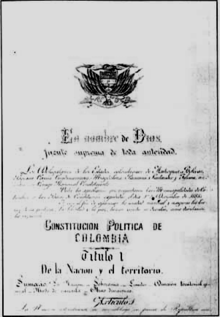Regeneration (Colombia)
The Regeneration (Spanish: La Regeneración) was a political movement that emerged in Colombia in the late second half of the 19th century, led by Rafael Núñez.
At the moment, Núñez was the leader of the majority of congress in his address in the inauguration of Trujillo on April 1, 1878, he stated: «We have arrived at the point in which we are confronting this very dilemma: a fundamental administrative Regeneration or catastrophe».
It gave great autonomy to the states, assured the freedom of the press, enterprise, association, bearing and trade of arms and mobility to and from the country.
[4] During the Radical Liberals rule there were advances in education with the founding of the National University of Colombia in 1867, on infrastructure (railroads) and communications (telegraph).
[5] Once in power, the Regeneration movement introduced reforms that ultimately led to summoning an assembly of delegates to write a new constitution.
[7] Regeneration established the basis for the return of a protectionist state, in which the central government, was again endowed with the powers enumerated within the 1863 Constitution of Rionegro.
It also gave the church the administration of birth and death certifications, public and municipal cemeteries, official marriage and forbade divorce.
[12] Additionally the continuous abridgment of rights by the ruling conservative party and the use of government forces against the opposition, the suppression of the press and laws like the Law of the Horses (Ley de los Caballos or Ley 61 de 1888) which permitted the administrative repression of what the executive deemed contrary to public order or property and impose imprisonment, banishment or loss of political rights without court or trial.


